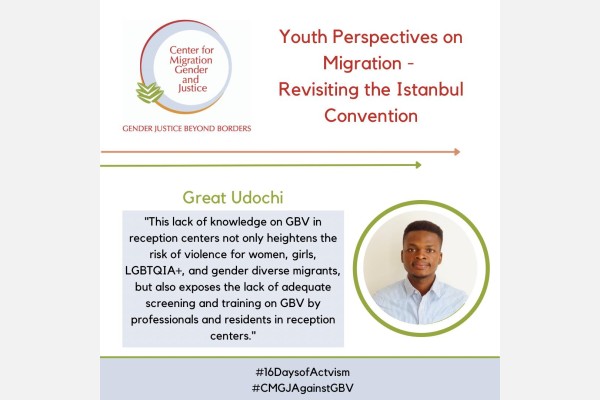Repository of Practices

Gender Justice Beyond Borders - Migrant Youth Leadership Program (MYLP)
Secondary GCM Objectives
Dates
Type of practice
Geographic scope
Geographic Scope:
Summary
Migrants (of varied statuses) constitute a population that is bound by policies over which they have limited control. In many countries, migrants are restricted from voting, running for office, and other forms of political engagement. These limitations on agency, representation, and accountability in the political sphere are especially pervasive for migrant youth who face intersectional challenges in regards to meaningful political engagement (i.e. age, nationality, citizenship, race, ethnicity, gender identity, sexuality etc.).
In order to support the meaningful political engagement of migrant youth, the Gender Justice Beyond Borders - Migrant Youth Leadership Program (MYLP) trains migrant youth (18-30 years) for collective action at the intersection of migration and gender. The six-month program consists of three components: Education; Online Course Research; Workshop Series Advocacy; Campaign Curation “16 Days of Activism against Gender-Based Violence”. Throughout the program, migrant youth leaders learn about concepts, theories, legal-institutional frameworks and lived experiences as it pertains to migration and gender, conduct research on gender-based violence (GBV) in the context of migration, and curate the annual 16 Days of Activism Against Gender-Based Violence Campaign of the Center for Migration, Gender, and Justice (CMGJ).
In its first rendering (2021), the program’s geographical scope covered Europe, focused on the Istanbul Convention, and was supported by the European Network Against Racism (ENAR). In its second rendering (2022), the program will again be supported by ENAR and will focus on migrant domestic workers (MDWs) in Europe within the framework of the International Labor Organization (ILO) Convention C190 on harassment and violence in the world of work. The MYLP has had a lasting impact not only for a new generation of migrant youth leaders, but also for migration governance writ large as the program shrinks spaces between migrant communities and governing bodies - literally and figuratively.
Organizations
Main Implementing Organization(s)
Detailed Information
Partner/Donor Organizations
Benefit and Impact
As part of the Research Section, migrant youth leaders complete a four-week online workshop. The workshop outlines qualitative and quantitative approaches in the study of migration and gender. The goals of the Research Section are to provide migrant youth leaders with skills in data collection, analysis, and discussion, as well as policy analysis, evaluation, and monitoring.
As part of the Advocacy Section, migrant youth leaders complete an eight-week online/in-person training. The training provides mechanisms through which advocates create change. The goals of the Advocacy Section are to equip migrant youth leaders with advocacy strategies such as symbolic-, leverage-, and accountability politics, as well as frame alignment and resonance.
The program’s main outputs include activities related to the curation of the 16 Days of Activism Against Gender-Based Violence Campaign, namely an educational social media series, an advocacy event, and a research publication. All three sections of the program thus build on each other, resulting in these outputs, and prepare migrant youth to become leaders in the political sphere.
The program’s impact is regularly assessed (qualitatively and quantitatively) with evaluation forms for each section (education, research, and advocacy) as well as an overall evaluation form, accompanied by a debrief session at the end of the program. In 2021, the program was featured as a youth-led solution for education by the United Nations Office of the Secretary General’s Envoy on Youth.
Key Lessons
Recommendations(if the practice is to be replicated)
Innovation
Additional Resources
Additional Images
Date submitted:
Disclaimer: The content of this practice reflects the views of the implementers and does not necessarily reflect the views of the United Nations, the United Nations Network on Migration, and its members.
More Related Practices:
- Comité de Cultura de Paz y Derechos Humanos
- Disaggregated Data Action Plan (DDAP) - Statistics Canada
- Immigration, Refugees, and Citizenship Canada’s Use of Gender Based Analysis Plus (GBA Plus)
- Alianza Social IntegraCallao
- A Journey of a Thousand Mile Begins with a single Step: Djibouti’s Experience in Strengthening Migration and Displacement Data Governance
Peer Reviewer Feedback:
*References to Kosovo shall be understood to be in the context of United Nations Security Council resolution 1244 (1999).
Newsletter
Subscribe to our newsletter.




